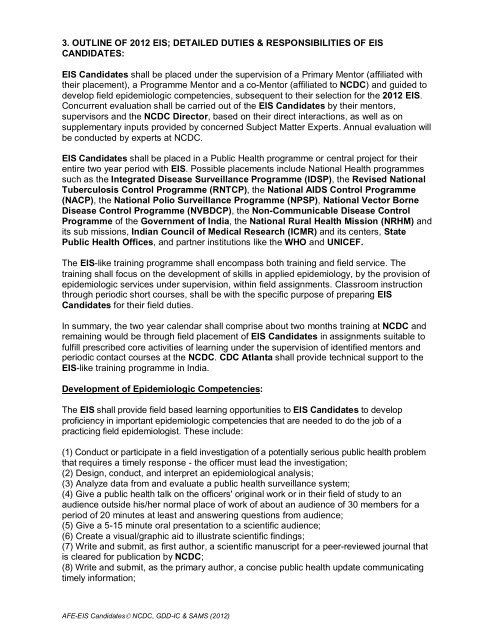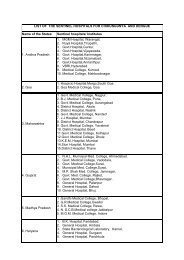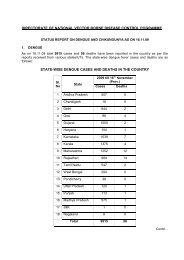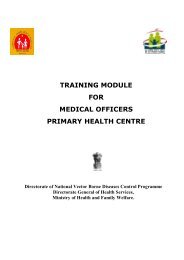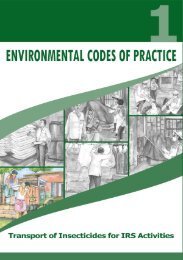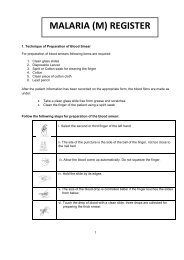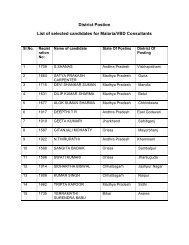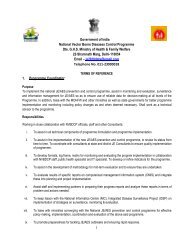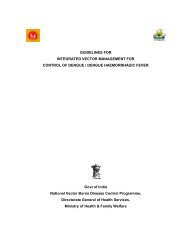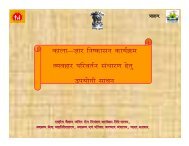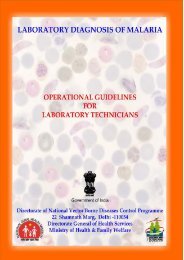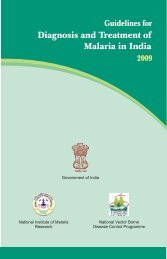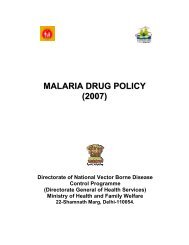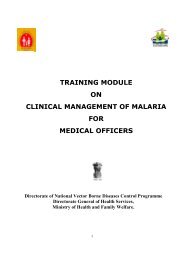(EIS) LIKE TRAINING PROGRAMME IN INDIA - NVBDCP
(EIS) LIKE TRAINING PROGRAMME IN INDIA - NVBDCP
(EIS) LIKE TRAINING PROGRAMME IN INDIA - NVBDCP
Create successful ePaper yourself
Turn your PDF publications into a flip-book with our unique Google optimized e-Paper software.
3. OUTL<strong>IN</strong>E OF 2012 <strong>EIS</strong>; DETAILED DUTIES & RESPONSIBILITIES OF <strong>EIS</strong>CANDIDATES:<strong>EIS</strong> Candidates shall be placed under the supervision of a Primary Mentor (affiliated withtheir placement), a Programme Mentor and a co-Mentor (affiliated to NCDC) and guided todevelop field epidemiologic competencies, subsequent to their selection for the 2012 <strong>EIS</strong>.Concurrent evaluation shall be carried out of the <strong>EIS</strong> Candidates by their mentors,supervisors and the NCDC Director, based on their direct interactions, as well as onsupplementary inputs provided by concerned Subject Matter Experts. Annual evaluation willbe conducted by experts at NCDC.<strong>EIS</strong> Candidates shall be placed in a Public Health programme or central project for theirentire two year period with <strong>EIS</strong>. Possible placements include National Health programmessuch as the Integrated Disease Surveillance Programme (IDSP), the Revised NationalTuberculosis Control Programme (RNTCP), the National AIDS Control Programme(NACP), the National Polio Surveillance Programme (NPSP), National Vector BorneDisease Control Programme (<strong>NVBDCP</strong>), the Non-Communicable Disease ControlProgramme of the Government of India, the National Rural Health Mission (NRHM) andits sub missions, Indian Council of Medical Research (ICMR) and its centers, StatePublic Health Offices, and partner institutions like the WHO and UNICEF.The <strong>EIS</strong>-like training programme shall encompass both training and field service. Thetraining shall focus on the development of skills in applied epidemiology, by the provision ofepidemiologic services under supervision, within field assignments. Classroom instructionthrough periodic short courses, shall be with the specific purpose of preparing <strong>EIS</strong>Candidates for their field duties.In summary, the two year calendar shall comprise about two months training at NCDC andremaining would be through field placement of <strong>EIS</strong> Candidates in assignments suitable tofulfill prescribed core activities of learning under the supervision of identified mentors andperiodic contact courses at the NCDC. CDC Atlanta shall provide technical support to the<strong>EIS</strong>-like training programme in India.Development of Epidemiologic Competencies:The <strong>EIS</strong> shall provide field based learning opportunities to <strong>EIS</strong> Candidates to developproficiency in important epidemiologic competencies that are needed to do the job of apracticing field epidemiologist. These include:(1) Conduct or participate in a field investigation of a potentially serious public health problemthat requires a timely response - the officer must lead the investigation;(2) Design, conduct, and interpret an epidemiological analysis;(3) Analyze data from and evaluate a public health surveillance system;(4) Give a public health talk on the officers' original work or in their field of study to anaudience outside his/her normal place of work of about an audience of 30 members for aperiod of 20 minutes at least and answering questions from audience;(5) Give a 5-15 minute oral presentation to a scientific audience;(6) Create a visual/graphic aid to illustrate scientific findings;(7) Write and submit, as first author, a scientific manuscript for a peer-reviewed journal thatis cleared for publication by NCDC;(8) Write and submit, as the primary author, a concise public health update communicatingtimely information;AFE-<strong>EIS</strong> Candidates NCDC, GDD-IC & SAMS (2012)


